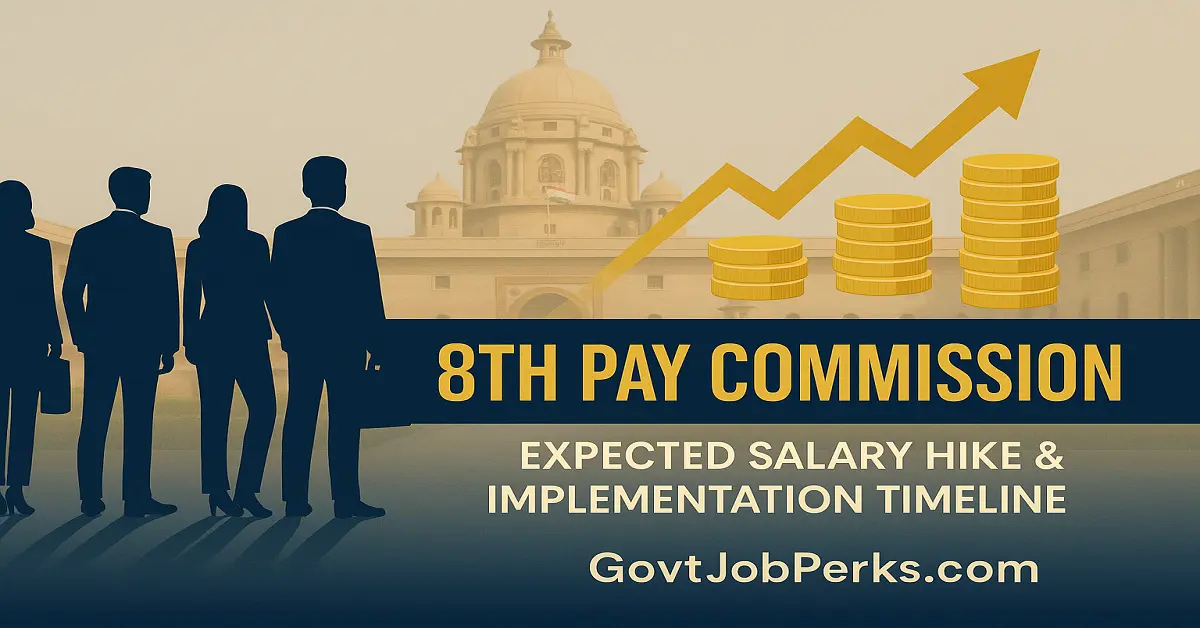8th Pay Commission: Expected Hike, Timeline, and Key Updates
Introduction
The long-awaited 8th Pay Commission is finally gaining momentum. After months of speculation, reliable sources have confirmed that the Centre is likely to set up the Eighth Pay Panel next week, almost ten months after receiving Cabinet approval. This announcement has sparked excitement among over 1.15 crore serving and retired Central Government employees — and millions of State Government staff who usually benefit when states follow suit.
Eighth Pay Panel Likely to Be Set Up Next Week
According to government sources, the terms of reference (ToR) have already been finalized, along with the names of the Chairman and Members of the 8th Pay Commission.
The Commission will oversee the decadal revision of pay, pensions, and allowances for Central Government employees.
The move comes about a year later than historical precedents. However, if the notification is issued by November 2025, the report is expected to be ready by late 2027, and implementation could take effect from January 2028.
That said, there are ongoing efforts to shorten this timeline, which may allow the revised pay structure to be implemented as early as 2027. Even if the implementation takes time, the government may still choose to make the new pay scales effective from January 1, 2026, and release arrears later.
Prime Minister Narendra Modi approved the constitution of the 8th Pay Commission on January 16, 2025, and since then, inputs have been gathered from State Governments, PSUs, and other key stakeholders to ensure a comprehensive review.
How Much Salary Will Hike in 8th Pay Commission?
This is the question every government employee is asking.
While the official figures are yet to be declared, early discussions suggest a possible fitment factor range between 1.8 and 2.86 could be considered — leading to a varying salary hike for different levels of employees.
The new basic pay will be calculated using the formula:
New Basic Pay = Old Basic Pay × Fitment Factor
For example, if an employee’s current basic pay is ₹50,000, then based on the possible range:
- At 1.8 fitment factor → ₹90,000
- At 2.86 fitment factor → ₹1,43,000
For a detailed breakdown, you can check out our 8th Pay Commission Salary Calculator to estimate your potential salary under the new structure.
Will DA Be Zero After 8th Pay Commission?
Yes — but only temporarily.
Once the new pay structure is implemented, Dearness Allowance (DA) will be reset to zero, just as it was after previous Pay Commissions.
After that, DA will again start accumulating every six months based on inflation and the Consumer Price Index (CPI).
This ensures that employees’ purchasing power remains protected even after pay revisions.
What About the 8th Pay Commission Fitment Factor?
The fitment factor plays a vital role in determining the new basic pay. It’s the multiplier applied to an employee’s existing basic pay to calculate the revised salary under the new Pay Commission.
Experts believe the 8th Pay Commission Fitment Factor could be between 1.8 and 2.86, depending on inflation, fiscal room, and employee demands.
For a deeper insight, visit our detailed post on 8th Pay Commission Fitment Factor.
Implementation Timeline: What to Expect
If everything proceeds as planned:
- Commission formation: November 2025
- Report submission: Late 2027
- Implementation date: Early 2027 to January 2028
- Effective date (retrospective): January 1, 2026
The retrospective application means employees will receive arrears once the implementation is approved — a major financial boost for millions of families.
Broader Impact
Once implemented, the 8th Pay Commission will directly impact:
- Over 1.15 crore serving and retired Central Government employees
- Millions of State Government employees, as most states adopt the Central structure later
- Pensioners, whose pensions will also be revised accordingly
This revision will not just increase salaries but also influence pensions, allowances, and retirement benefits across departments.
Bottom Line
The upcoming 8th Pay Commission marks another significant chapter in the financial journey of government employees.
While the final recommendations are still awaited, early signals suggest a fair balance between employee welfare and fiscal prudence.
Employees can stay updated with regular, reliable coverage on GovtJobPerks.com, where we simplify pay commission updates, calculators, and government perks — all in one trusted space.

